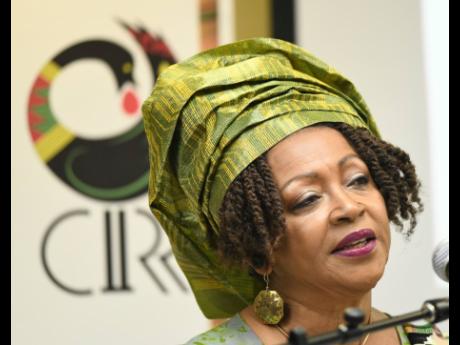Professor Verene Shepherd elected to chair UN treaty body
On Monday, April 11, in Geneva, Switzerland, The Committee on the Elimination of Racial Discrimination (CERD) elected its new bureau, with Professor Verene Albertha Shepherd of Jamaica as its chair.
It happened during CERD’s 106th session in which anti-discrimination efforts by Cameroon, Estonia, Luxembourg and Kazakhstan were slated to be reviewed. The committee also heard three newly elected members make a solemn declaration, and adopted the session’s agenda.
In speaking with The Gleaner last Monday, Shepherd, who is also the director at the Centre for Reparation Research, said, “It’s quite an honour for me to have been elected chair of this treaty body, because it’s really a historic moment.”
She has been a member of that committee since 2016 and will be chair for two years.
Shepherd is the first Jamaican and CARICOM national to sit on this the UN’s oldest treaty committee, for which she has won the highest number of votes among those who competed for a seat for two consecutive years. Her candidacy was supported by CARICOM.
SIGNIFICANT APPOINTMENT
She was also a member of the UN’s Working Group of Experts on People of African Descent, for which she was chair from 2012-14, and for which she helped to draft the programme of activities for the UN’s International Decade for People of African Descent (2015-2024). The CERD appointment is significant, Shepherd said, because we are still in the Decade for People of African Descent. “I’m honoured to be chair as we are still in the decade,” she shared.
CERD is one of 10 UN human-rights treaty bodies, and consists of independent experts who monitor the implementation of the Convention on the Elimination of All Forms of Racial Discrimination by its states parties. It works to take action against the injustice of racial discrimination, and the dangers it represents.
The committee meets in Geneva and normally holds three sessions per year. The current members are from Qatar, Algeria, Poland, Republic of Korea, Côte d’Ivoire, Cameroon, Senegal, Turkey, China, USA, Mauritania, Germany, Greece, Togo, South Africa, Peru, Mauritius, and Jamaica.
The position of chair is rotated by region every two years, and this time around it was the Regional Group of Latin American and Caribbean Countries’ (GRULAC) turn. This is the group to which Shepherd belongs, and though she was tapped to be the next chair, the appointment had to go through a formal process.
She was nominated by long-standing member Gay McDougall, the representative from the USA, who is also senior fellow and distinguished scholar-in-residence at the Leitner Center for International Law and Justice/Center for Race, Law and Justice, Fordham University School of Law. McDougall’s proposal was supported by GRULAC and the other regional groups, and thus Shepherd was duly appointed.
A TREATY BODY WITH GENDER BALANCE
Shepherd described the moment as “moving” and “humbling”, as McDougall’s proposal was like a “tribute”. She is particularly proud because CERD “is now the only treaty body with gender balance,” and the women on the committee are happy for her.
She said she was looking forward to the appointment because it would be an opportunity to represent the region, to work for the elimination of racial discrimination, to work with states to protect the vulnerable and marginalised people of African descent, refugees, migrants, asylum seekers, victims of war, etc. “It’s a very good place to be if you are a human-rights activist, as I am,” Shepherd declared.
The social historian on a committee with mostly lawyers is up to the task, and wants to bring more visibility and awareness of CERD in GRULAC, “to show that the Caribbean has talent and we are on the international stage as academics and human-rights defenders. We in the Caribbean have a role to play in the international dialogue of the elimination of racial discrimination,” she told The Gleaner.
She said, also, there is a treaty body-strengthening process that is yet to be adopted. It is about how to make treaty bodies function more efficiently and harmoniously. She would like to see CERD sign on to that outcome document. She also wants to see non-governmental organisations (NGOs) from the region take an interest in the work of her committee, as many NGOS from other regions are involved.

